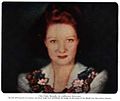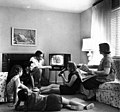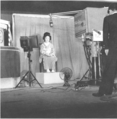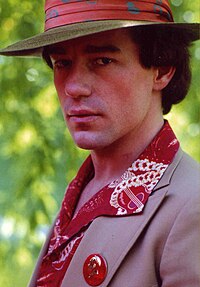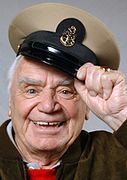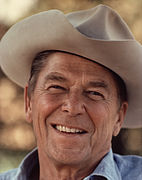Portal:Television
The Television Portal
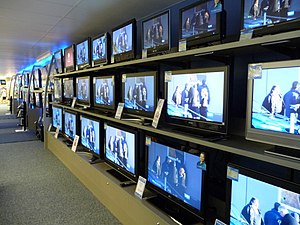
Television (TV) is a telecommunication medium for transmitting moving images and sound. Additionally, the term can refer to a physical television set, rather than the medium of transmission. Television is a mass medium for advertising, entertainment, news, and sports. The medium is capable of more than "radio broadcasting", which refers to an audio signal sent to radio receivers.
Television became available in crude experimental forms in the 1920s, but only after several years of further development was the new technology marketed to consumers. After World War II, an improved form of black-and-white television broadcasting became popular in the United Kingdom and the United States, and television sets became commonplace in homes, businesses, and institutions. During the 1950s, television was the primary medium for influencing public opinion. In the mid-1960s, color broadcasting was introduced in the U.S. and most other developed countries.
In 2013, 79% of the world's households owned a television set. The replacement of earlier cathode-ray tube (CRT) screen displays with compact, energy-efficient, flat-panel alternative technologies such as LCDs (both fluorescent-backlit and LED), OLED displays, and plasma displays was a hardware revolution that began with computer monitors in the late 1990s. Most television sets sold in the 2000s were flat-panel, mainly LEDs. Major manufacturers announced the discontinuation of CRT, Digital Light Processing (DLP), plasma, and even fluorescent-backlit LCDs by the mid-2010s. LEDs are being gradually replaced by OLEDs. Also, major manufacturers have started increasingly producing smart TVs in the mid-2010s. Smart TVs with integrated Internet and Web 2.0 functions became the dominant form of television by the late 2010s. (Full article...)
Selected article -
Carnivàle (/ˌkɑːrnɪˈvæl/) is an American television series set in the United States Dust Bowl during the Great Depression of the 1930s. The series, created by Daniel Knauf, ran for two seasons between 2003 and 2005. In tracing the lives of disparate groups of people in a traveling carnival, Knauf's story combined a bleak atmosphere with elements of the surreal in portraying struggles between good and evil and between free will and destiny. The show's mythology draws upon themes and motifs from traditional Christianity and gnosticism together with Masonic lore, particularly that of the Knights Templar order.
Carnivàle was produced by HBO and aired between September 14, 2003, and March 27, 2005. Its creator, Daniel Knauf, also served as executive producer along with Ronald D. Moore and Howard Klein. Jeff Beal composed the original incidental music. Nick Stahl and Clancy Brown starred as Ben Hawkins and Brother Justin Crowe, respectively. The show was filmed in Santa Clarita, California, and nearby Southern California locations.
Selected image -

The Federal Communications Commission (FCC) is a United States government agency, created, directed, and empowered by Congressional statute (see 47 U.S.C. § 151 and 47 U.S.C. § 154), and with the majority of its commissioners appointed by the current president. The FCC was established by the Communications Act of 1934 as the successor to the Federal Radio Commission and is charged with regulating all non-Federal Government use of the radio spectrum (including radio and television broadcasting), and all interstate telecommunications (wire, satellite and cable) as well as all international communications that originate or terminate in the United States.
Did you know (auto-generated) -

- ... that the radio station at Western Washington University interfered with telephone and television services in a campus dormitory?
- ... that One Chun, a Michelin Guide Bib Gourmand restaurant, has black-and-white televisions, transistor radios, and aged clocks on a wall?
- ... that Toshiki Seto was cast in the television adaptation of Senpai, This Can't Be Love! because, according to the creator, he could express emotion through his stare?
- ... that the exclusive secret society Hamilton House from the television show Gossip Girl was based on St. Anthony Hall, a social and literary fraternity?
- ... that the day employees of Boston television station WLVI received new business cards, they learned the station would be sold and they would lose their jobs?
- ... that an NFL scheduling decision forced ESPN to change the kickoff times and television networks of the 2022 Las Vegas Bowl and the 2022 New Mexico Bowl?
Selected quote -
More did you know
- ...that The Simpsons and Philosophy: The D'oh! of Homer, a book that analyzes the The Simpsons using philosophical concepts, is the main textbook in philosophy courses offered at some universities?
- ...that the fight scene between Peter Griffin and a giant chicken on Family Guy episode Blind Ambition was originally created for the episode Cleveland Loretta Quagmire?
- ...that Dyesebel, a popular mermaid character in Filipino comic books, cinema and television, was based on Philippine folklore?
- ...that Robert Raymond founded Australia's longest running current affairs television program?
- ...that Russian television implied that Filipp Kirkorov won the Eurovision Song Contest 1995 with "Kolibelnaya Dlya Vulkana" when he in fact only came 17th?
Selected biography -
James Thomas Aubrey Jr. (December 14, 1918 – September 3, 1994) was an American television and film executive. As president of the CBS television network from 1959 to 1965, with his "smell for the blue-collar," he produced some of television's most enduring series on the air, including Gilligan's Island and The Beverly Hillbillies.
Under Aubrey's leadership, CBS dominated American television, leading the other networks NBC and ABC, by nine points and seeing its profits rise from $25 million in 1959 to $49 million in 1964. The New York Times Magazine in 1964 called Aubrey "a master of programming whose divinations led to successes that are breathtaking". Aubrey had replaced CBS Television president Louis G. Cowan, who was dismissed after the quiz-show scandals. Aubrey's tough decision-making earned him the nickname "Smiling Cobra" during his tenure. (Full article...)General images
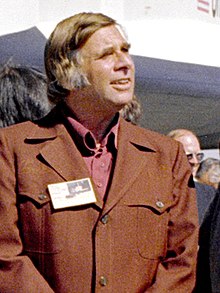
Gene Roddenberry (August 19, 1921 – October 24, 1991) was an American screenwriter and producer of several television series, best known for his work in creating the Star Trek franchise. Before his television writing career, he was a pilot in the 394th Bomb Squadron, 5th Bombardment Group of the Thirteenth Air Force during World War II. During his time in the military, he flew the Boeing B-17 Flying Fortress, and was awarded both the Air Medal and the Distinguished Flying Cross. While working in the Los Angeles Police Department after the war, he began his television writing career, but resigned to concentrate on screenwriting. His first writing award was for an episode of Have Gun – Will Travel entitled "Helen of Abajinan" which won the Writers Guild of America award for Best Teleplay in 1958. In 1964, he registered the idea with the Writers Guild which would define the rest of his career—Star Trek.
The majority of the awards and nominations received by Roddenberry throughout his career were related to Star Trek. He was credited for Star Trek: The Original Series (known at the time simply as Star Trek) during the nominations for two Emmy Awards, and won two Hugo Awards. One Hugo was a special award for the series, while another was for "The Menagerie", the episode which used footage from the original unaired pilot for Star Trek, "The Cage". In addition, he was awarded the Brotherhood Award by the National Association for the Advancement of Colored People for his work in the advancement of African American characters on television. (Full article...)
News
- December 28: US professional wrestler Jon Huber dies aged 41
- September 2: Tributes paid to recently deceased US actor Chadwick Boseman
- May 24: Japanese professional wrestler and Netflix star Hana Kimura dies aged 22
- January 16: BBC newsreader Alagiah to undergo treatment for bowel cancer
- Upcoming events
Featured content
Main topics
History of television: Early television stations • Geographical usage of television • Golden Age of Television • List of experimental television stations • List of years in television • Mechanical television • Social aspects of television • Television systems before 1940 • Timeline of the introduction of television in countries • Timeline of the introduction of color television in countries
Inventors and pioneers: John Logie Baird • Alan Blumlein • Walter Bruch • Alan Archibald Campbell-Swinton • Allen B. DuMont • Philo Taylor Farnsworth • Charles Francis Jenkins • Boris Grabovsky • Paul Gottlieb Nipkow • Constantin Perskyi • Boris Rosing • David Sarnoff • Kálmán Tihanyi • Vladimir Zworykin
Technology: Comparison of display technology • Digital television • Liquid crystal display television • Large-screen television technology • Technology of television
Terms: Broadcast television systems • Composite monitor • HDTV • Liquid crystal display television • PAL • Picture-in-picture • Pay-per-view • Plasma display • NICAM • NTSC • SECAM
Categories
WikiProjects

|
You are invited to participate in WikiProject Television, a WikiProject dedicated to developing and improving articles about Television. |
- Main projects
- Sub-projects
Television Stations • American animation • American television • Australian television • British TV • BBC • Canadian TV shows • Television Game Shows • ITC Entertainment Productions • Digimon • Buffyverse • Doctor Who • Degrassi • EastEnders • Episode coverage • Firefly • Futurama • Grey's Anatomy • Indian television • Lost • Nickelodeon • The O.C. • Professional Wrestling • Reality TV • The Simpsons • Seinfeld • South Park • Stargate • Star Trek • Star Wars • Soap operas • Avatar: The Last Airbender • House
- Related projects
Animation • Anime and manga • Comedy • Comics • Fictional characters • Film • Media franchises
What are WikiProjects?
Things you can do

- Place the {{WikiProject Television}} project banner on the talk pages of all articles within the scope of the project.
- Write: Possible Possum
- Cleanup: color television, Alien Nation: Body and Soul, The Sopranos, Alien Nation: Dark Horizon, Alien Nation: The Enemy Within, Alien Nation: Millennium, Aang
- Expand: Timeline of the introduction of color television in countries
- Stubs: Flow (television), Just for Kicks (TV series), Play of the Month, Nova (Dutch TV series), More stubs...
Subportals
Related portals
Associated Wikimedia
The following Wikimedia Foundation sister projects provide more on this subject:
-
Commons
Free media repository -
Wikibooks
Free textbooks and manuals -
Wikidata
Free knowledge base -
Wikinews
Free-content news -
Wikiquote
Collection of quotations -
Wikisource
Free-content library -
Wikiversity
Free learning tools -
Wiktionary
Dictionary and thesaurus










